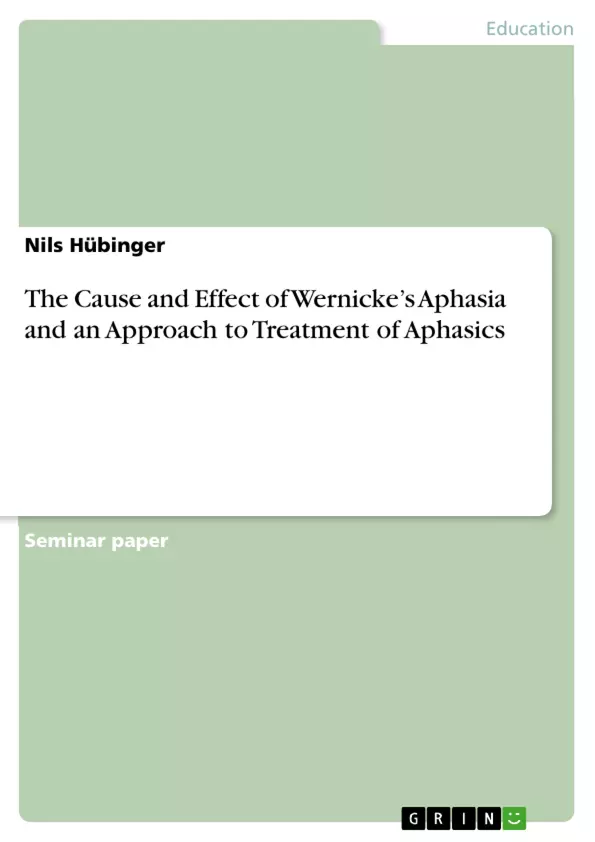In our daily lives, language plays an important role. The ability to use spoken or written language in order to express meaning is essential and enables people to cope with situations in which communication via language is indispensable. As a matter of fact, there are certain diseases that decrease an individual’s ability to express him- or herself properly without decline of intelligence. In general, this phenomenon is called aphasia, which literally means without language; though the ability to speak remains in most cases. Aphasia is a disturbance in the established language system of a person due to brain injury. Some signals that might indicate that a patient is suffering from aphasia are for example: problems to build correct sentences in written and spoken language, usage of inappropriate words in certain situations, invention of neologisms, inability to recognize own mistakes (in some cases), or errors on phonological basis. According to the symptoms the individual patient shows, there are four major categories in which aphasia can be subdivided: global aphasia, amnesic aphasia, Broca’s aphasia and Wernicke’s aphasia. It is worth mentioning that other types of aphasia and mixtures of these four categories also exist. Especially, when practicing with aphasia patients, new problems may arise and shift the respective form of aphasia towards another. On the one hand, aphasia is a very interesting phenomenon. On the other hand, it is a severe impairment for patients, which makes it hard to cope with the challenges of daily life. Since aphasia is a very complex topic, this term paper will focus only on Wernicke’s aphasia because it is distinct to the other types concerning the patients’ awareness. A patient who suffers from Wernicke’s aphasia is mostly unaware of the mistakes he or she makes. The only thing realized by the patient, is, that he or she is not performing very well. Through this, it becomes interesting to explore Wernicke’s aphasia and at the same time difficult to find a treatment.
This term paper commences by giving a detailed explanation of what Wernicke’s aphasia is. Here, its effect on patients’ language production and reception is described. In addition, a closer look at brain anatomy will be taken in order to understand the disease in detail. Finally, methods of treatment for aphasics will be introduced and explained. There are also a number of advices given, which help friends and family members to cope with the patient’s impairment.
Inhaltsverzeichnis (Table of Contents)
- Introduction
- What Specifically Is Wernicke's Aphasia?
- How can Aphasics be Treated Successfully?
- Conclusion
Zielsetzung und Themenschwerpunkte (Objectives and Key Themes)
The aim of this paper is to examine the nature of Wernicke's aphasia, exploring its cause, effects, and potential treatment methods.
- The nature of Wernicke's aphasia and its impact on language production and reception.
- The role of brain anatomy in Wernicke's aphasia.
- The challenges of treating Wernicke's aphasia.
- Strategies for assisting patients with Wernicke's aphasia.
- The importance of understanding the patient's perspective.
Zusammenfassung der Kapitel (Chapter Summaries)
The introductory chapter discusses the significance of language in daily life and introduces the concept of aphasia, highlighting its various forms. The chapter emphasizes the unique characteristics of Wernicke's aphasia, particularly the patient's unawareness of their speech errors.
Chapter two delves into the specifics of Wernicke's aphasia, exploring its causes and its impact on language processing. It provides a visual representation of the brain regions involved in language production, focusing on the role of Wernicke's area and its connection to Broca's area. The chapter also includes a real-life example of a conversation with a patient suffering from Wernicke's aphasia, showcasing the difficulties they face in communicating effectively.
Schlüsselwörter (Keywords)
Wernicke's aphasia, language production, language reception, brain anatomy, treatment, aphasia, communication impairment, mental lexicon, fluent aphasia, stroke.
- Quote paper
- Nils Hübinger (Author), 2010, The Cause and Effect of Wernicke’s Aphasia and an Approach to Treatment of Aphasics, Munich, GRIN Verlag, https://www.grin.com/document/213776



